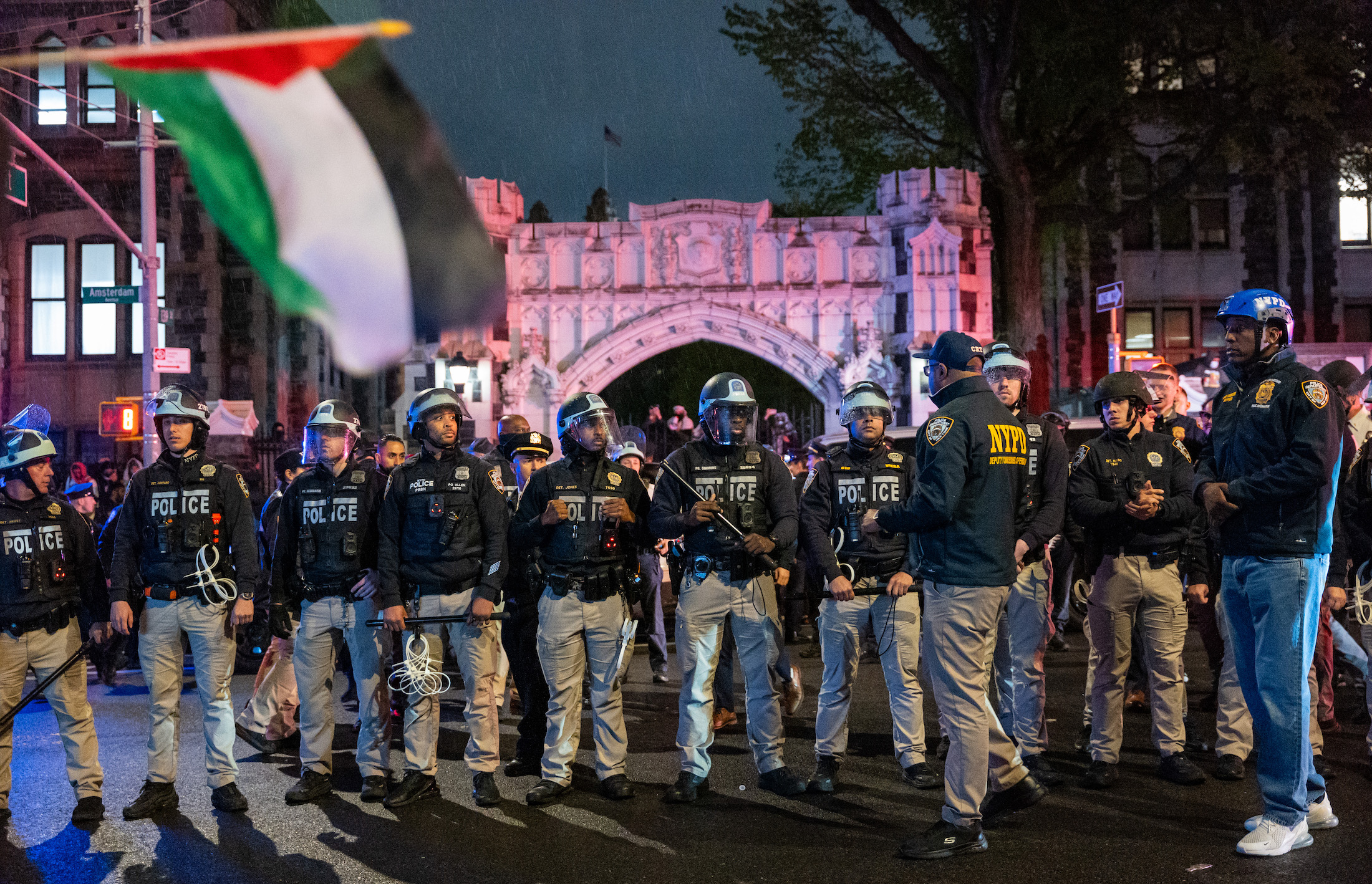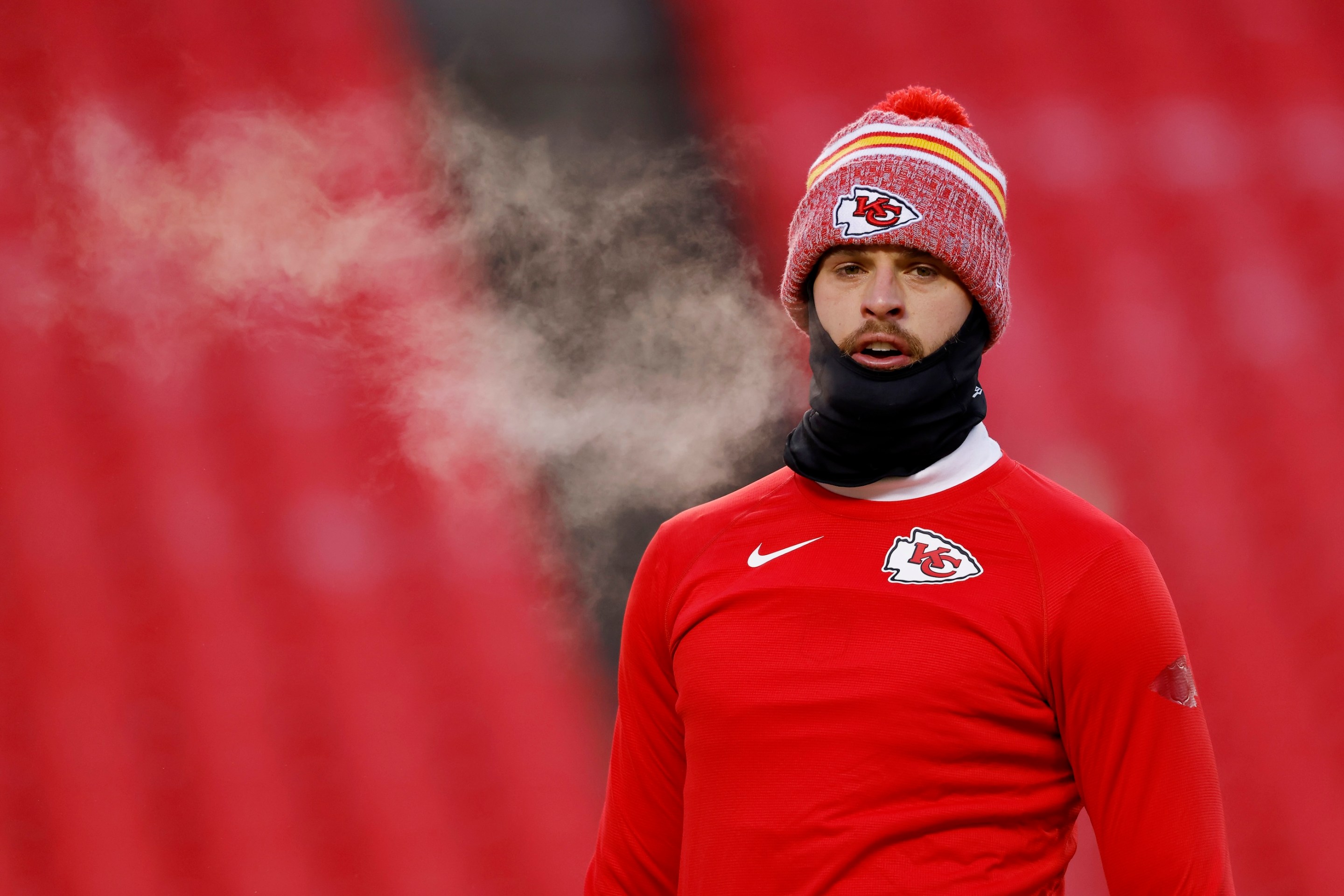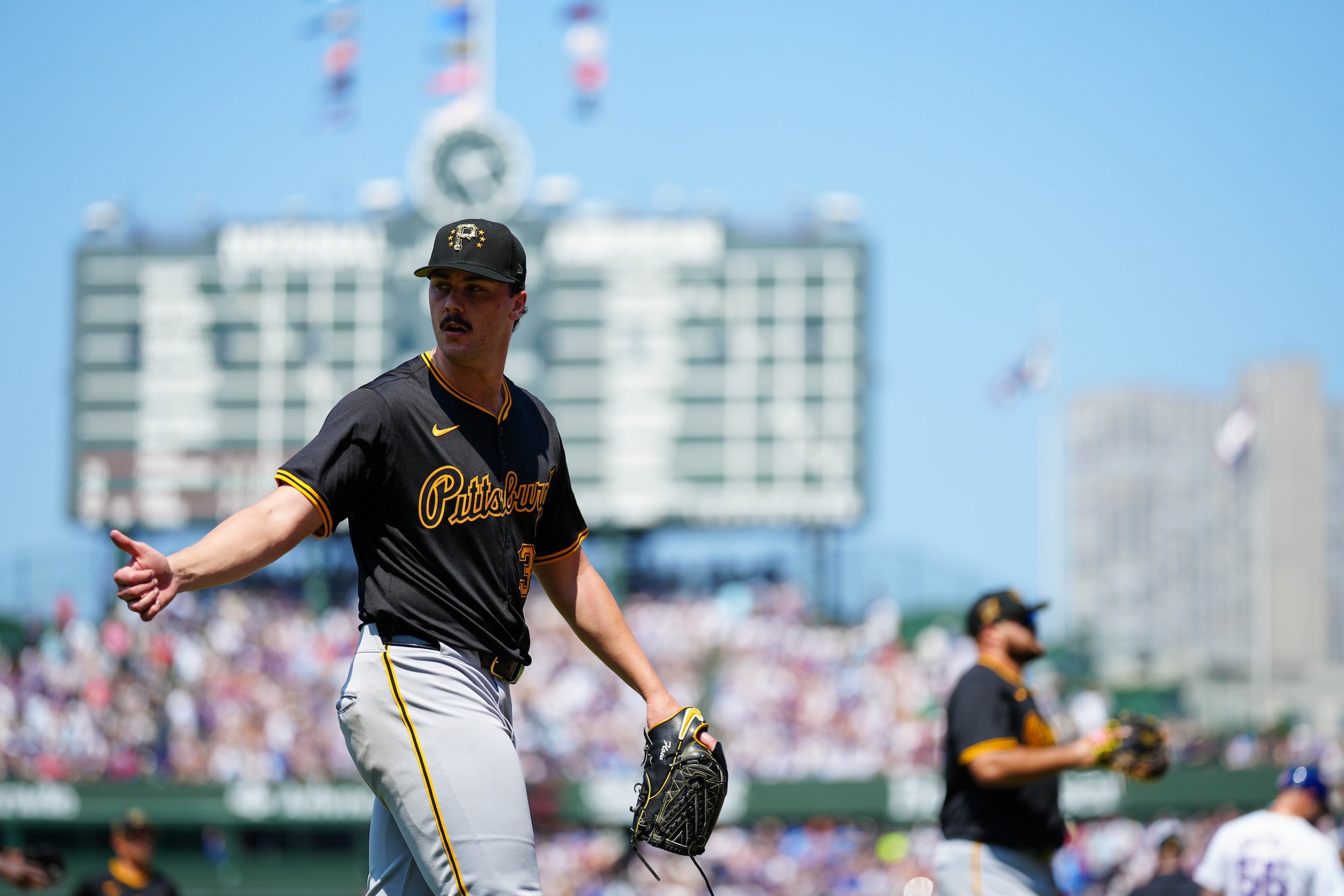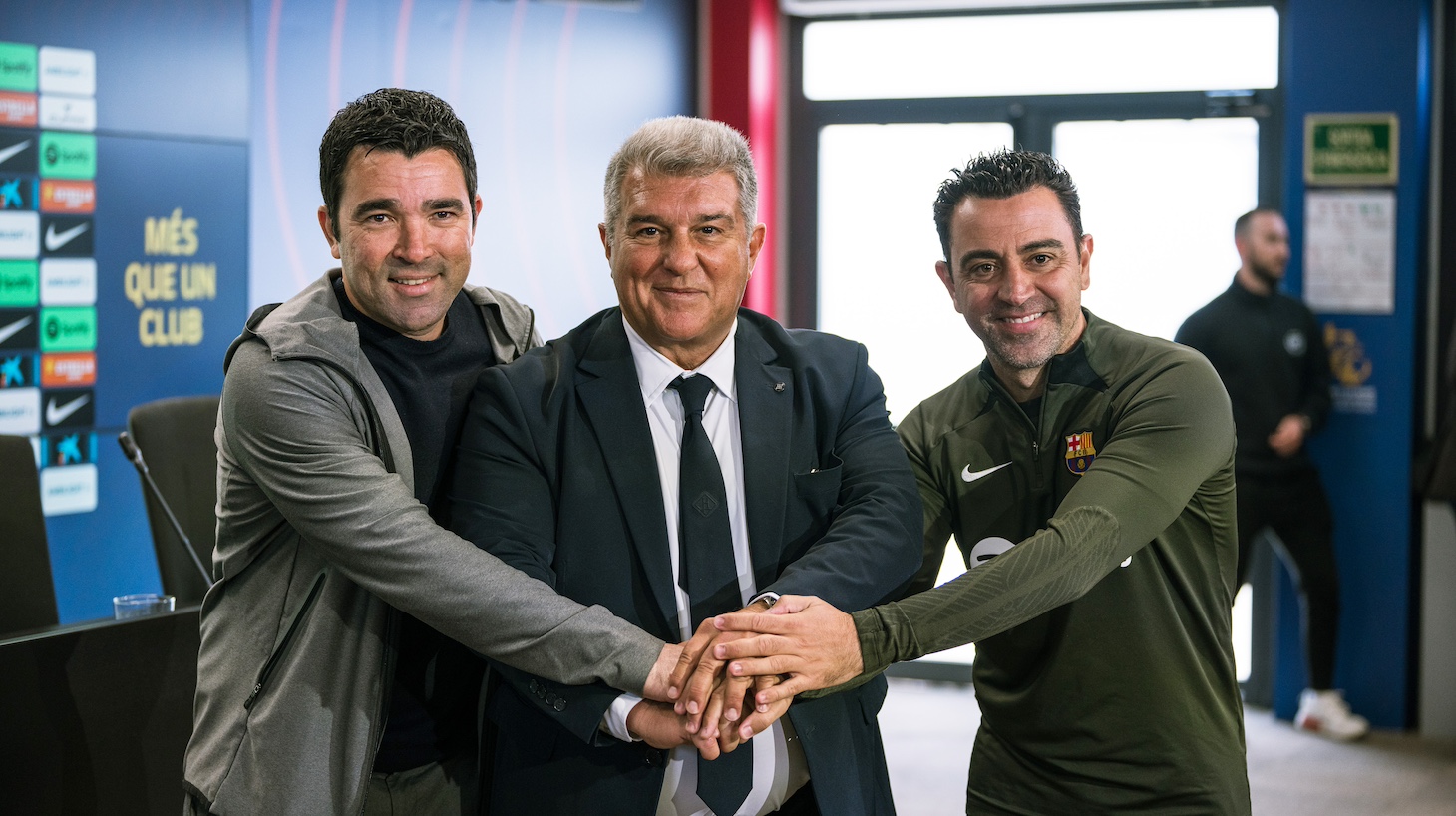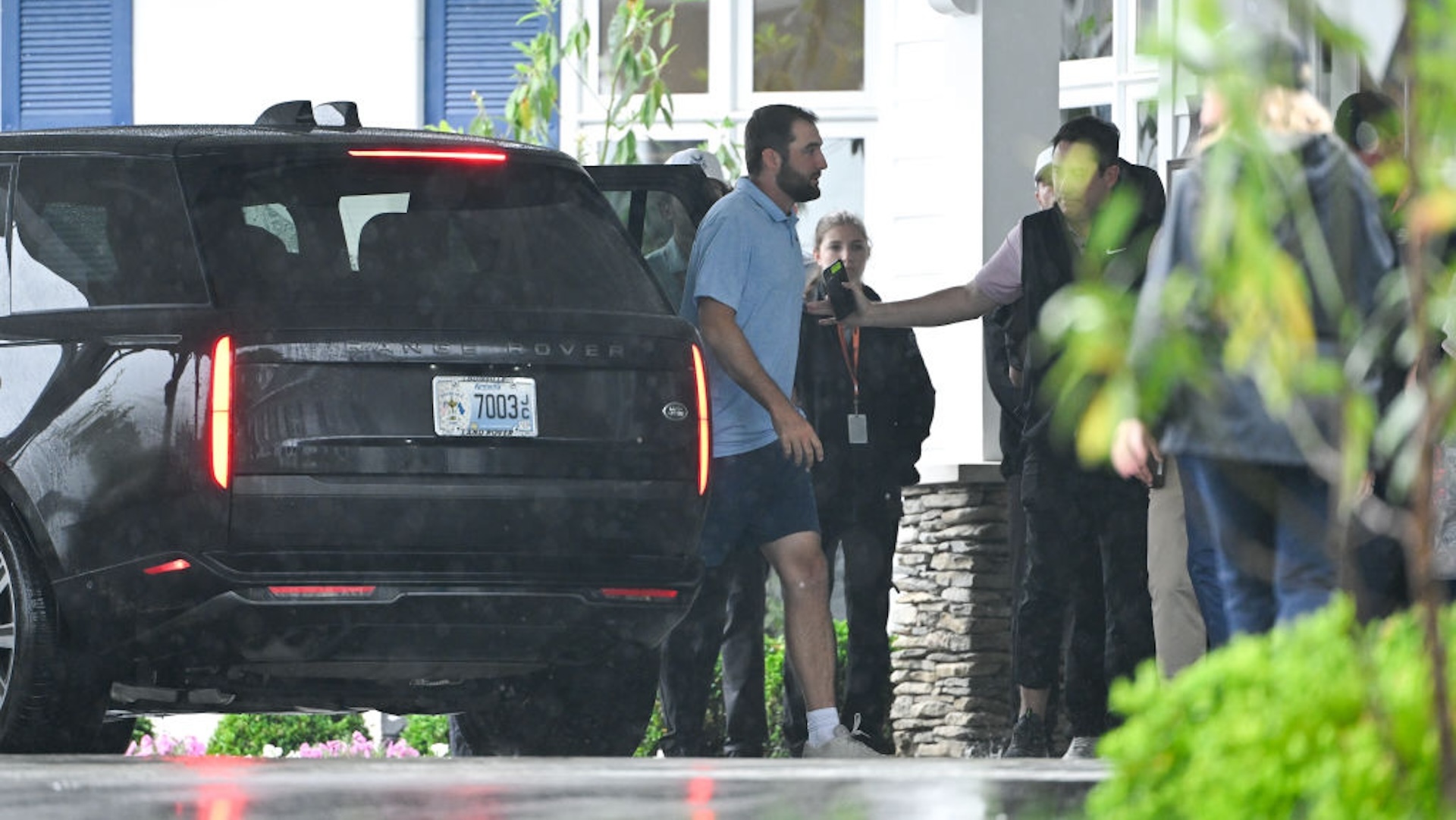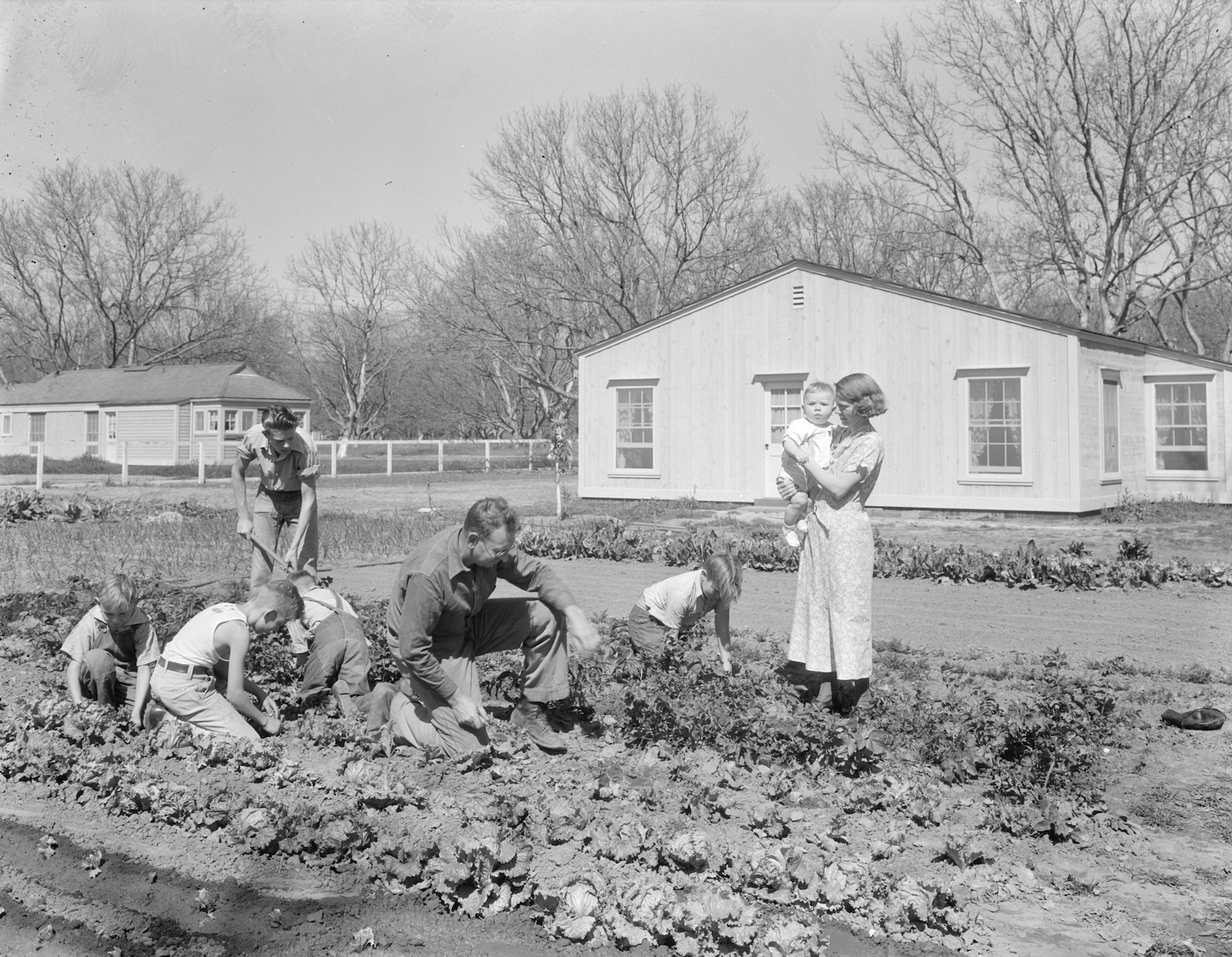Shortly after the New York Police Department began to tear apart the Gaza Solidarity Encampment at Columbia University Tuesday night, another swarm of cops raided a similar encampment on the quad along Convent Avenue at City College of New York. The NYPD reportedly made 173 arrests at CCNY, using disproportionate force against college students and other demonstrators who protested Israel's bombing of Palestinians. At the end of the night, the police filmed a propagandist clip of an American flag flying on the quad.
Leon Orlov-Sullivan, the primary editor-in-chief of the student-run Campus Magazine, was there that night, streaming what he could through the publication’s Instagram account. In his capacity as a student journalist, he provided real-time updates on the encampment and showed what the police were doing to protestors on and outside of campus. At one point, Orlov-Sullivan documented the badge numbers and names of officers so that viewers could look up the complaints against them, and then read them back to the officers. He was there until the early hours of the morning, when the cops told him to go home.
I had the chance to speak with Orlov-Sullivan on a phone call Thursday afternoon. Our conversation has been lightly edited for clarity.
How have you been doing in the days since the crackdown?
Still kind of riding off the—it was a very stressful night. And so in the days since, I've still kind of felt that reverberating stress, reverberating tension. Everything definitely feels a little bit more intense than usual. Classes have been online. Mostly, I guess, just feeling more tension than usual in the days since Tuesday night, which is when the encampment was shut down.
I know that you said that classes are virtual, but have you been able to walk around campus?
No, I believe that campus is fully closed. I was outside of campus last night, and they had all the barricades up. I was there at maybe 6:00 [p.m.] yesterday, because there was a press conference by organizers of the event and a rally that I went to, to report on it and livestream it for the Campus Magazine. You couldn't get in. There was no access to campus.
What is your role at the Campus Magazine? How did you get involved in the magazine to begin with?
I got involved in the magazine because I was speaking with somebody who was at that point editor-in-chief my freshman year, Kazi Maisha—she was a biology major who I met through a science major thing. I'm a physics and art history dual major now, but [at the time] I was a physics major. I met her, and she suggested that I start writing for the magazine. And I had a friend from another college who wrote for their college's newspaper, and they encouraged me, so I joined. After that, I became arts and entertainment editor. And after that, I became editor-in-chief.
Is the Campus Magazine the primary student publication? Is there another student newspaper [for CCNY]?
The Campus Magazine is the oldest publication not just in City College, but throughout the entire CUNY system. We've been around since 1907, so we have over a century of service to City College and the Harlem community. That's one of our slogans. I think we're the biggest, but there’s also a newspaper, The Paper. I think they were founded in 1969 after the CCNY student takeover of the campus, to give more voice to that. We probably have the most reach. We have the most Instagram followers, if that's a measure of anything. But there are other student publications, and there's also a news station on our campus, WCCR.
What was your Tuesday night like?
Tuesday, I got there after all the cops had—I'm not sure who exactly put up the final part of the barricade. I think CUNY public service put up—a few days before, they put up partial barricades, but you could still get in and out pretty easily. On Tuesday night, maybe 7:45, they blocked those all off. I didn't see that, but I got a message about that happening. Then I got to campus, and I was able to get in through a gap in the barricades. I wasn't told that I was trespassing. I didn't get yelled at by any officers or anything.
It was pretty chaotic. People were saying a lot of different things. Some people were saying that people were trying to get into the administration building. Some people were saying that people had gotten into the administration building. It was all just super chaotic. Earlier in the day, CUNY administration had sent a message to the organizers, demanding that the encampment be cleared by [Wednesday] morning. So, I think a lot of people were on edge because of that. And a lot of people thought that there was going to be a sweep of the encampment either that night or the morning after.
Overall, Tuesday night was really intense, in one word. I started livestreaming after I got there. It was really stressful being the only person there who was CCNY student media, being the only person inside who was doing live reporting. There were some other press. I didn't see it with my own eyes, but I saw later in a video that a member of the press had been pepper-sprayed, I believe, by CUNY public safety. Not student press, but just press in general. So yeah, it was just really intense as the night went on, especially as it got later in the night. People started fleeing the encampment, because they didn't want to get arrested. Then I had to make the decision: Stay and try to watch everything and report on everything as it was happening.
At what point in the night did you realize that it was kind of different than the previous times you had been observing the encampment?
I realized as soon as I was there, because people were fleeing, people were looking for ways out. Also, people weren't allowed to get in. I also saw—maybe this was as I arrived or soon after I arrived. It wasn't near where I arrived through, so I'm not sure when it actually started. But there were protesters up at 140th [Street] and Convent Avenue towards the north side of campus where there was a barricade, where people could not get in—members of the public, CUNY students, CCNY students could not get in—and protesters were there. Protesters were being dispersed by police officers. There was one of those loud NYPD announcement systems that was saying to protesters outside of the encampments—this was not anywhere near where I was … basically that they were going to be arrested [if they did not disperse].
At what point did you get the idea to start recording the cops' badge numbers and names?
When we were just standing outside. I think maybe somebody in the comments said, Look at their badge numbers. We were kind of in a gap between the protesters and a larger group of police officers, so I just started talking to one and got his badge number, and then I went to the side and started just going through all of them.
Yeah, that was at the point where I started watching.
Earlier—I'm not sure if you saw—we were there when they tore down the encampment, and when they entered campus and whatnot. That was the most intense part of the night for me. The part that went the most viral was probably talking to the police officers, but the most intense part of that was when they cleared the encampment.
Were you surprised by the reactions of the police, outside of looking up the badge numbers and the names? What was your reaction to watching how the police handled that situation?
The greatest impression that I got watching the takedown of the encampment was ... I was impressed by how militaristic the entire police operation was. I saw them all line up at a part of the quad that was sort of higher than the rest of the quad. And then they entered through one entrance—there's four entrances, there's no gate at any of them. It's just that there's a stone wall, because of the strange terrain of the quad. The quad is level, so one part is higher and there's this stone wall and you can stand over it. And there were, I think, hundreds of police officers who were all standing there, and then they went in and they broke down one of the barricades that the protesters had set up. They went through and basically destroyed the encampment. Then they went to the middle and arrested the people. The most surprising thing for me was … yeah, that.
And then, I was also—I wasn't really surprised, because I had heard of things like this happening in the past. But I definitely felt a bit … I don't even know the words, but I felt like when I saw people being arrested pretty intensely, people who were peaceful protesters on a public sidewalk, being thrown to the ground by police officers—that was very intense. I felt very worried for people who were protesting because I didn't know what was going to happen to them. I didn't know how the police officers were going to treat them. I saw them being corralled in with batons and stuff. At some point, there was a group of protesters who had been squished together so much that they were chanting that they couldn't breathe. I know people from that group who woke up the next morning still having chest and rib pain, because they were kind of being corralled in by police batons up against the 139th Street gate.
One thing that I thought was interesting was when we spoke with one officer—there were a lot of officers there. But when we focused on one officer, Raymond Williams—I don't remember the badge number, but you can find it.
I think it’s 6728, because I was watching.
Yeah. Raymond Williams, 6728—he had $140,000 in settled litigation from New York’s money. That's what we found. And then he also had a 32-day suspension for [recording his exposed testicles with his colleague’s bodycam]. When we read that to him, he laughed, and all the officers around him were just laughing. There was something else when we were talking to him, we [mentioned the] $140,000 litigation, and the police officers were all saying, Not true, not true. Then we listed off all of his lawsuits, and he confirmed each of them. Then we, in front of him, added them up to find that they were in fact $140,000. The way that police were so quick to say, Oh, it's not true. It's not true. They're all lying. The way that the police officers all seemed to want to downplay the incidents in which they had done things that were found to be wrong by the government. They were all laughing about it. That was something that was interesting to see.
So you had the idea from Instagram comments, or people who were watching suggested it?
Yeah, people were saying, Show their badge numbers—I was kind of focusing on the police when I was livestreaming it, because I wanted to show everybody the sheer amount of police. I wanted to show everybody the police presence outside campus. So I was focusing on the police, so I was kind of videoing them, and showing all of them. I think people were commenting, Show their names and badge numbers, because they do have to have those available.
How would you compare what you did on the livestream—not just showing the badge numbers, but recording what was happening through the livestream—to how other reporters covered the encampments?
Overall?
Yeah.
Well, I would say we were closer to the encampment for a longer time. There was a reporter from the New York Times there, and there were a lot of other press people there earlier in the night, even after the encampment had been blocked off from the outside entrance, but I think I was the last person, who was actually around the encampment, from the press. I think that's something about student journalism: Student journalists care about what happens at their colleges, because they have a connection to their colleges, so I really wanted to be able to report if there was anybody who was being treated unfairly, or I just really wanted to show everybody what was happening inside of the encampment.
A lot of people were telling me "Stay safe" and stuff, because I think a lot of people felt like I was at risk. There was a point where—people were fleeing, people were leaving, people who were remaining inside after a certain point. And we remained inside after this point. People were standing inside, telling other people to take their things. Somebody had a laptop that they sent out with somebody, because at a certain point, everybody who was still inside understood that there was a risk of being arrested. I feel like, for one, we stayed longer. We stayed just until, as you can see on the Live, the police told me individually to leave. I think that’s one aspect of it.
Has your time covering the encampments—more generally, not just the night of the crackdown—has it made you feel differently about the practice of journalism, either for better or for worse?
Yeah, it definitely made me feel like journalism is more important, especially seeing how many people didn't know what was going on and were asking questions. Seeing so many people from City College, including students, faculty, staff—seeing them tell me that they've gotten information about what's been going on from my coverage has definitely made me feel like it's more important to cover these things. It has made me feel like journalism is more important, because otherwise, they really just wouldn't know.
For example, the dean of one of the departments said that she was told in a Discord server that certain people hadn't been arrested. And I was able to respond to her, because I was there as a journalist. I was able to tell her that people we saw were arrested—they weren't just given summons, they were arrested. I contacted a friend of mine, whose sister is a lawyer. I contacted the lawyer, who confirmed for us that what we saw was an arrest. So it definitely made me feel like journalism is important, more so than before, because otherwise people just don't know what's going on. People just don't know what's going on, especially in these high-intensity situations without journalists who are present at the situation, whose sole focus is reporting it and getting as much information about the situation as it develops live.
Just out of curiosity, because I know you said you're a physics and art history double major: Have you taken any journalism classes or electives, or has all of your experience come from working for The Campus?
I have not taken any journalism courses or electives. Well, I did write a few articles for my high school’s astronomy club's newspaper. So I guess that would be some, but I don't have any actual formal journalistic experience at all, which is why I felt even more pressure reporting on all this, because I just—I'm not necessarily fluent in all of the style of journalism. I don't have all that instinctive training, I guess. That's what I think made it a lot more intense, but I was still the only person who was on campus at the encampment all the time, and that's something that was part of my decision to go live. Being alone and stuff, I didn't have the time to write an article or anything. So I was just like, Whatever, I'm just gonna go live. I'm not even going to try to write something and worry about how I'm formatting quotes, how I'm formatting dates and whatnot. I'm just gonna go live and show people firsthand, as a primary source, what's going on.
Now that you're a couple of days removed, what are your feelings toward the City College administration?
I don't know how unbiased I'm supposed to stay, but I guess I would say my feelings towards the administration is … well, I'll say I'm looking forward to speaking with President Vincent Boudreau about the decision to call in the NYPD, and to get more information. That's my main feeling. I'm trying to mostly focus on this as a journalist, I guess. Yeah, that's my main feeling toward the administration.
Has he agreed to talk to you?
We spoke on Tuesday, and I was in contact with his office earlier today. We were talking about scheduling an interview. So yeah, he has agreed to talk to me.
I look forward to seeing what he says to you.
Yeah.
